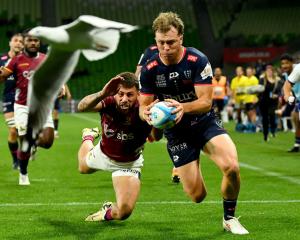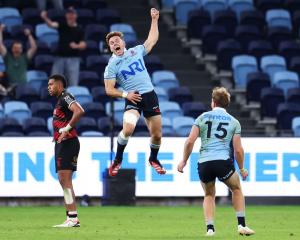ODT Online rugby writer Jeff Cheshire identifies some key points from the All Blacks' 58-14 victory over Namibia in London today.
Stop-start game not good for rugby
The biggest story from this game will be the stop-start nature of the second half. There seemed to be more time spent standing around doing nothing than actually playing. It probably helped Namibia, in that it prevented the All Blacks from getting a flow on, but it certainly made for an awful watch.
From a rugby perspective, we do not want matches like this. This World Cup is being watched all over the world in countries where rugby is not a big sport. As far as growing the game in these places, the World Cup needs to have as many attractive games as possible and limit frustrating matches such as this one.
Flat backline not working
Playing with such a flat backline meant the All Blacks were having to catch and pass under pressure, with defenders all over them. That is not easy to do and this team is not good enough to be playing that game on a consistent basis. It led to dropped balls and poor passes, which saw their attack break down too often.
Howver, it is hard to read anything into this. The result of this game was never in doubt and the All Blacks would not have wanted to give too much away in terms of their tactics. So they were likely playing a conservative, generic brand of rugby that got the job done.
Need to avoid bad habits
As much as you don't want to give yourself away in these games, it is still dangerous to get carried away in some areas. Take the scrum, in which the All Blacks had the kind of advantage they won't have against stronger packs. Particularly in the first half they used their superior scrum as a weapon, rather than just as a platform.
From this they got penalties, but it also caused a lot of scrum resets. The first point is not necessarily bad in the context of this game. But in the context of the tournament would it not have been better to make use of this as a chance to run through some set-plays or practice their attacking patterns against live opposition? As far as resets go, it would have been better if the All Blacks had simply done enough to win their ball and held the scrum up to make for a less stop-start game.
Discipline
Namibia finished with 30% of the possession and forced the All Blacks to make just 31 tackles. Yet the All Black defence was still intent on pushing the envelope. When Namibia decided to keep ball in hand, so often the All Blacks would infringe within a couple of phases. They were not under pressure and often the penalties were needlessly given away. Namibia were never going to be good enough to really make the All Blacks pay, but it will be enough to be a concern.
Namibia's strong challenge
The All Blacks were average, but you have to give Namibia some credit. That they were taking shots at goal despite being down 20 points suggested that they were trying to play for as respectable a result as possible, rather than a win. But who can blame them? That was what they were there to achieve and they look to have come a long way since the last World Cup.
Defensively they fought hard and tackled bravely, and in the first 20 minutes after the break they scored eight points, while only giving up seven, which was a huge period for them. It was inevitable that the All Blacks would wear them down, but it was a very respectable performance from the a team of part-timers who were the lowest ranked team in the tournament against the world champions and tournament favourites.
Is second-string team really an excuse?
This was far from the All Blacks' best team. But it was still a team which contained 23 professional players, more than enough to put in a dominant display. The forward pack scrummaged well, but were hardly stellar around the park, while the backline did not see enough good ball, particularly in the second half.
Much of that came from the tactics that were being used, but there were still few players who screamed out to be included in the top team. Nehe Milner-Skudder was outstanding with his speed and step, while Julian Savea worked hard to get involved when he wasn't seeing much ball. Sonny Bill Williams had some great touches again, although the question mark surrounding him was always if he could do it against the very top teams. Ben Smith looked good when he came one, while different forwards did well in patches.
No major injuries
Probably the biggest thing to come from this game was that there were no major injuries, which is always something that is feared before these games. There was not much to be gained for the All Blacks, but potentially so much to lose if an important player was to go down. That they came through unscathed will be relieving for everyone involved.
Hard to take too much away, but a win is a win
There is only so much you can take from some games and in this case there is not much at all. No one got injured and the All Blacks got the result they were looking for. They did not play as well as they should have and it was an awful game to watch, but come the business end of the tournament when the top XV is on the field, is anyone actually going to care?












